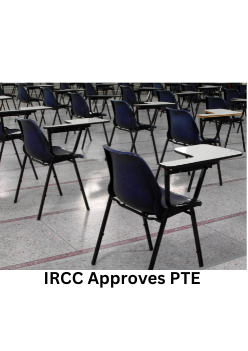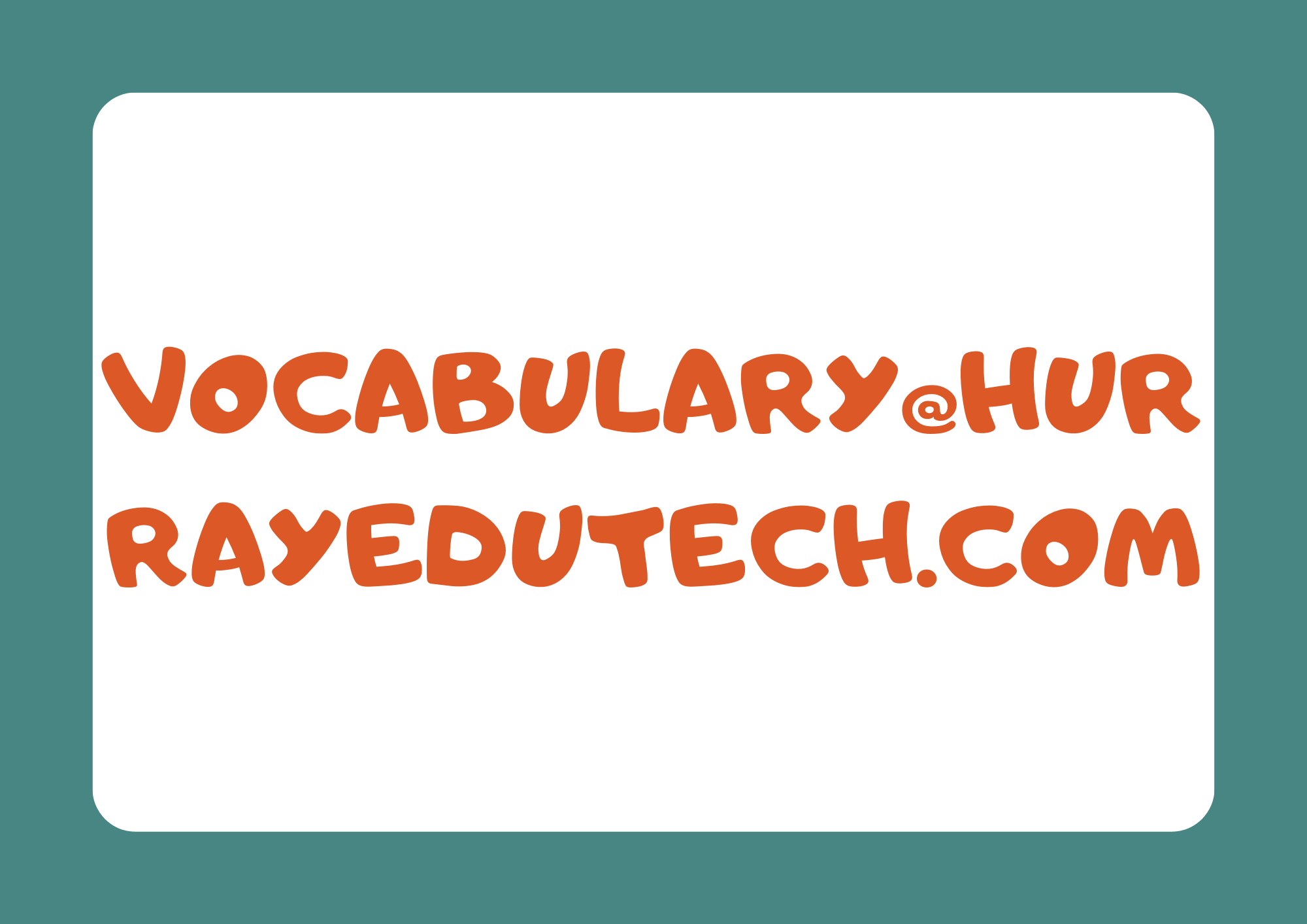Most of you must be frequently coming across the term ‘lexical resource’ as part of your IELTS/PTE and Spoken English training at HURRAY. Lexical resource, simply put, is nothing but the vocabulary you build towards enhancing your speaking and writing skills. And when the talk is of vocabulary, it would be worthwhile to get down to revisiting a fundamental component in English grammar and vocabulary called Parts of Speech (abbreviated form: PoS or POS).
In this blog post, we will take you through this basic grammatical concept that you must have had often come across in your school-day grammar textbooks!
In conventional grammar, a part of speech (abbreviated form: PoS or POS) is a group of words (or, further generally, of lexical matter) that has similar grammatical properties.
English language, too, has words that can be thought of as the smallest fundamentals that have unique implications. Based on their use and functions, words are categorized into several types or parts of speech. This post will re-familiarize you with the definitions and examples of the 8 major parts of speech in English grammar:Noun, Pronoun, Verb, Adverb, Adjective, Conjunction, Preposition, and Interjection.
THE EIGHT PARTS OF SPEECH
A part of speech indicates how a word functions in meaning as well as grammatically within the sentence. An individual word can function as more than one part of speech when used in different circumstances. Understanding parts of speech is essential for determining the correct definition of a word when using the dictionary.
- NOUN
A noun is the name of a person, place, thing, or idea.
Human… Bishop College… home… peace
A noun is a word for a person, place, thing, or idea. Nouns are often used with an article (the, a, an), but not always. Proper nouns always start with a capital letter; common nouns do not. Nouns can be singular or plural, concrete or abstract. Nouns show possession by adding ‘s. Nouns can function in different roles within a sentence; for example, a noun can be a subject, direct object (ex: John threw the ball), indirect object (ex: Rahim gifted his father a pen), subject complement (Shreya is a dancer), or object of a preposition.
The young student brought me a very long application from the principal, and then he suddenly disappeared. Oh no!
- PRONOUN
A pronoun is a word used in place of a noun.
She… we… they… it
A pronoun is a word used in place of a noun. A pronoun is usually substituted for a specific noun, which is called its antecedent. In the sentence above, the antecedent for the pronoun she is the girl. Pronouns are further defined by type: personal pronouns refer to specific persons or things; possessive pronouns indicate ownership; reflexive pronouns are used to emphasize another noun or pronoun; relative pronouns introduce a subordinate clause; and demonstrative pronouns identify, point to, or refer to nouns.
The young student brought me a very long application from the principal, and then he suddenly disappeared. Oh no!
- VERB
A verb expresses action or being.
Laugh… was… read… turn
The verb in a sentence expresses action or being. There is a main verb and sometimes one or more helping verbs. (“She can sing.” Sing is the main verb; can is the helping verb.) A verb must agree with its subject in number (both are singular or both are plural). Verbs also take different forms to express tense.
The young student brought me a very long application from the principal, and then he suddenly disappeared. Oh no!
- ADJECTIVE
An adjective modifies or describes a noun or pronoun.
Beautiful… new… pink… clever
An adjective is a word used to modify or describe a noun or a pronoun. It usually answers the question of which one, what kind, or how many. (Articles [a, an, the] are usually classified as adjectives.)
The young student brought me a very long application from the principal, and then he suddenly disappeared. Oh no!
- ADVERB
An adverb modifies or describes a verb, an adjective, or another adverb.
Calmly… tremendously… cleverly… rigorous
An adverb describes or modifies a verb, an adjective, or another adverb, but never a noun. It usually answers the questions of when, where, how, why, under what conditions, or to what degree. Adverbs often end in -ly.
The young student brought me a very long application from the principal, and then he suddenly disappeared. Oh no!
- PREPOSITION
A preposition is a word placed before a noun or pronoun to form a phrase modifying another word in the sentence.
By… with…. about… until
(By the shade, with our people, about the text, until next day)
A preposition is a word placed before a noun or pronoun to form a phrase modifying another word in the sentence. Therefore a preposition is always part of a prepositional phrase. The prepositional phrase almost always functions as an adjective or as an adverb. The following list includes the most common prepositions:
The young student brought me a very long application from the principal, and then he suddenly disappeared. Oh no!
- CONJUNCTION
A conjunction joins words, phrases, or clauses.
and… but… or… while… because
A conjunction joins words, phrases, or clauses, and indicates the relationship between the elements joined. Coordinating conjunctions connect grammatically equal elements: and, but, or, nor, for, so, yet. Subordinating conjunctions connect clauses that are not equal: because, although, while, since, etc. There are other types of conjunctions as well.
The young student brought me a very long application from the principal, and then he suddenly disappeared. Oh no!
- INTERJECTION
An interjection is a word used to express emotion.
Oh!… Wow!… Oops!
An interjection is a word used to express emotion. It is often followed by an exclamation point.
The young student brought me a very long application from the principal, and then he suddenly disappeared. Oh no!
Examples: Eight Parts of Speech
1. Noun
This part of a speech refers to words that are used to name persons, things, animals, places, ideas, or events. Nouns are the simplest among the 8 parts of speech, which is why they are the first ones taught to students in primary school.
Examples:
- Richard Gereis very versatile.
- The italicized noun refers to a name of a person.
- Kittens can be extremely cute.
In this example, the italicized word is considered a noun because it names an animal.
- Today is my birthday.
The word “birthday” is a noun which refers to an event.
There are different types of Nouns:
- Proper– proper nouns always start with a capital letter and refers to specific names of persons, places, or things.
Rudyard Kipling wrote many books.
Mini is the cutest kitten ever.
I’m craving Chocolates.
- Examples: Lamborghini, Dominoes’ Pizza, Big Brother
- Common– common nouns are the opposite of proper nouns. These are just generic names of persons, things, or places.
I want to be a painter.
I’d like to adopt a dog.
Would you like a chocolate?
- Examples: car, pizza parlour, TV series
- Concrete– this kind refers to nouns which you can perceive through your five senses.
- Common Concrete Nouns
- dog, girl, cat, water, air, etc.
- Countable Concrete Nouns
- singular -chair, song, computer, window
- plural – chairs, songs, computers, windows
- Uncountable Concrete Nouns
- water, air, sugar, oil, rice, salt, cheese etc.
- Proper Nouns
- Tom Brown, Mr. Mike Jones, Audrey Ryan
Examples:
- Go on, put your foot on the stairs and feel that raw power.
- Our class graduates three years from now.
- Suddenly, a large roaring black panther appeared from behind the bush.
- Happiness is like a soft rabbit.
- Mother’s kitchen always smells like cloves during the holidays.
- Watch out for that army of ants.
- Nita liked the stillness of the forest.
- The sunset unfurled ribbons of red, purple, and gold across the sky.
- Our team is enjoying an unbroken winning streak.
- Walking home I was caught by rain droplets that fell like bullets from the sky.
- You haven’t lived until you’ve seen a herd of wild horses, running.
- Cookies baking in the oven means Aunt has come to visit.
- Nina nestled the black kitten in her arms.
- There’s a pack of wolves outside.
- Mia and Jane ordered a large pizza for lunch.
- You can have a boiled egg with your breakfast.
- My car is making a weird noise.
- The highway was blocked by a traffic.
- I always put carrots in any salad.
- The soldier arrived home to the cheers of his family.
- Instead of a cherry, she put a strawberry on the top of my ice-cream.
- Let’s serve drinks before dinner.
Examples: folder, sand, board
- Abstract-unlike concrete nouns, abstract nouns are those which you can’t perceive through your five senses.
- The education of children should be our main concern.
- He was willing to sacrifice his job in order to move to Canada.
- Childhood memories are sources of great happiness.
- Music can change a mood or be a creative outlet.
- Restoration of electric service is important after a natural calamity.
- Examples: happiness, grudge, bravery
- Count– it refers to anything that is countable, and has a singular and plural form.
- There are at least ten Chinese restaurants in china town.
- Mira took a lot of photographs when she went to the Goa.
- Your book is on the kitchen table.
- How many candles are on that birthday cake?
- You have several paintings to study in art appreciation class.
- There’s a big black dog running around the neighborhood.
- Examples: kitten, video, ball
- Mass– this is the opposite of count nouns. Mass nouns are also called non-countable nouns, and they need to have “counters” to quantify them.
- There is no more water in the lake.
- Please help yourself to some cheese.
- I need to find information about Bookers Prize winners.
- You seem to have a high level of intelligence.
- Please take good care of your health.
- Let’s get rid of the junk.
Examples of Counters: kilo, cup, meter
Examples of Mass Nouns: rice, flour, garter
- Collective– refers to a group of persons, animals, or things.
- Our class took a field trip to the science museum.
- The herd of goats ran across the prairie, leaving a massive dust cloud in its wake.
- We waited anxiously for the jury to come to a decision.
- This year’s basketball team includes five players who are over six feet tall.
- Napoleon’s army was finally conquered at Waterloo.
- The town congress has approved plans to create a new park.
- He comes from a big family: he’s the oldest of ten kids.
- The rock group has been on tour for weeks.
- Everyone in the audience commended loudly when Elvis appeared on stage
Example: faculty (group of teachers), class (group of students), pride (group of lions)
2. Pronoun
A pronoun is a part of a speech which functions as a replacement for a noun. Some examples of pronouns are: I, it, he, she, mine, his, hers, we, they, theirs, and ours.
Demonstrative Pronouns
These pronouns are used to demonstrate (or indicate). This, that, these and those are all demonstrative pronouns.
Examples:
- Thisis the one I left in the taxi.
(In this example, the speaker could be indicating to a mobile phone, in which case, the pronoun this replaces the words mobile phone.)
- Shall I take those?
Indefinite Pronouns
Unlike demonstrative pronouns, which point out specific items, indefinite pronouns are used for non-specific things. This is the largest group of pronouns. All, some, any, several, anyone, nobody, each, both, few, either, none, one and no one are the most common.
Example:
- Somebodymust have seen the driver leave.
(Somebody – not a specific person)
- We are allin the gutter, but some of us are looking at the stars. (Oscar Wilde)
- I have nothingto declare except my genius. (Oscar Wilde)
Interrogative Pronouns
These pronouns are used in questions. Although they are classified as pronouns, it is not easy to see how they replace nouns. Who, which, what, where and how are all interrogative pronouns.
Example:
- Whotold you to go there?
- Whichhorse won the race?
Personal Pronouns
The personal pronouns are I, you, he, she, it, we, they, and who. More often than not (but not exclusively), they replace nouns representing people. When most people think of pronouns, it is the personal pronouns that usually spring to mind.
Example:
- Wecan’t all be heroes because somebody has to sit on the curb and clap as they go by.
- Ibought some batteries, but they weren’t included.
Possessive Pronouns
Possessive pronouns are used to show possession. As they are used as adjectives, they are also known as possessive adjectives.
My, your, his, her, its, our and their are all possessive pronouns.
- Have you seen herbook?
(In this example, the pronoun her replaces a word like Sarah’s.)
Relative Pronouns
Relative pronouns are used to add more information to a sentence. Which, that, who (including whom and whose) and where are all relative pronouns.
Examples:
- Dr Sigmund Freud, wholectured at Cambridge for more than 12 years, should have known the difference.
(In this example, the relative pronoun who introduces the clause who studied at Cambridge for 12 years and refers back to Dr Sigmund Freud.)
- The man whofirst saw the rocket reported it as a UFO.
(In this example, the relative pronoun who introduces the clause who first saw the comet and refers back to the man.)
Absolute Possessive Pronouns
These pronouns also show possession. Unlike possessive pronouns (see above), which are adjectives to nouns, these pronouns sit by themselves.
Mine, yours, his, hers, ours and theirs are all absolute possessive pronouns.
Examples:
- The cars are as good as ours.
- Shall we take yoursor theirs?
Reciprocal Pronouns
Reciprocal pronouns are used for actions or feelings that are reciprocated. The two most common reciprocal pronouns are each other and one another.
Examples:
- They like one another.
- They talk to each otherlike they’re children.
Reflexive Pronouns
A reflexive pronoun ends …self or …selves and refers to another noun or pronoun in the sentence (usually the subject of the sentence). The reflexive pronouns aremyself, yourself, herself, himself, itself, ourselves, yourselves and themselves.
Examples:
- The cat bit itself.
(In this example, the intensive pronoun itself refers back to the noun the cat.)
- Are you relating to yourself?
Intensive (or Emphatic) Pronouns
An intensive pronoun (sometimes called an emphatic pronoun) refers back to another noun or pronoun in the sentence to emphasize it (e.g., to emphasize that it is the thing carrying out the action).
Examples:
- Jerry bakes all the bread himself.
(In this example, the intensive pronoun himself refers back to the noun Jerry.)
- The dog opened the door itself.
- Jane is a very stubborn child. Shejust stared at me and when I told her to stop.
- The smallest slice is mine.
- Weare number three.
The italicized words in the sentences above are the pronouns in the sentence.
3. Adjective
This part of a speech is used to describe a noun or a pronoun. Adjectives can specify the quality, the size, and the number of nouns or pronouns.
Sample Sentences:
- The carvings are intricate.
The italicized word describes the appearance of the noun “carvings.”
- I have two
The italicized word “two,” is an adjective which describes the number of the noun “hamsters.”
- Wow! That doughnut is huge!
The italicized word is an adjective which describes the size of the noun “doughnut.”
- They live in a big house.
- Chelsea is wearing a sleeveless shirt today.
- This food is not edible.
- She wore a lovely dress.
- He writes pointless letters.
- This store is much nicer.
- She wore a lovely dress.
- Berry is an adorable baby.
- Wanda’s hair is gorgeous.
- This glass is breakable.
- I met a homeless person in London.
- This house is bigger than that one.
- This flower is more beautiful than that.
- He is taller than Mr. Luge.
- He is more intelligent than this boy.
- Jon is the most handsome man on campus.
4. Verb
This is the most important part of a speech, for without a verb, a sentence would not exist. Simply put, this is a word that shows an action (physical or mental) or state of being of the subject in a sentence.
Examples of “State of Being Verbs”: am, is, was, are, and were
Sample Sentences:
- As usual, the Stormtroopersmissed their shot.
- The italicized word expresses the action of the subject “Stormtroopers.”
- They are always prepared in emergencies.
- The verb “are” refers to the state of being of the pronoun “they,” which is the subject in the sentence.
- Anthor is throwing the football.
- She accepted the job offer.
- He thought about his stupid mistake in the test.
- Joe visited his friend for a while and then went home.
- The dog ran across the yard.
- She left in a hurry.
- She yelled when she hit her toe.
- The cat sat by the window.
- I will learn to play the guitar this year.
- He hit a home run at the last game.
- In the summer, we will swim in our pool.
- Will you help me with the laundry?
- He rode his new bike around the block for hours.
- The horse trotted along the trail.
- We ate dinner then walked around the park.
- Did you fix the mistake in your homework?
- She waited for her friend at the mall.
- She lay down on the couch and slept there all night.
- Close the door!
5. Adverb
Just like adjectives, adverbs are also used to describe words, but the difference is that adverbs describe adjectives, verbs, or another adverb.
The different types of adverbs are:
- Adverb of Manner– this refers to how something happens or how an action is done.
Example: Annie danced gracefully.
- The word “gracefully” tells how Annie danced.
- He sings well.
- He walked quickly.
- She sang softly.
- Jake coughed loudly to attract her attention.
- Adverb of Time- this states “when” something happens or “when” it is done.
Example: She came yesterday.
The italicized word tells when she “came.”
- Later Robin Hood stole the king’s crown. (The time is the most important element here.)
- Robin Hood later stole the king’s crown. (This is a formal way to use the adverb later. Notice how the statement sounds like it belongs in a police report.)
- Robin Hood stole the king’s crown later. (This is a neutral, standard way to use the adverb later.)
- He stayed at her grandmother’s house all day.
- Adverb of Place– this tells something about “where” something happens or”where” something is done.
Example: Of course, I looked everywhere!
- The adverb “everywhere” tells where I “looked.”
- Put the light
- After a long day at field, we headed homewards.
- Please bring that instrument here.
- My uncle’s house is
- Adverb of Degree– this states the intensity or the degree to which a specific thing happens or is done.
Example: The child is very talented.
The italicized adverb answers the question, “To what degree is the child talented?”
- Is your coffee hot enough?
- This box isn’t big enough.
- He didn’t work hard enough.
- I got here early enough.
6. Preposition
This part of a speech basically refers to words that specify location or a location in time.
Examples of Prepositions: above, below, throughout, outside, before, near, and since
Sample Sentences:
- Mira is hidingunder the bed.
The italicized preposition introduces the prepositional phrase “under the bed,” and tells where Micah is hiding.
- Duringthe game, the spectators never stopped cheering for their team.
The italicized preposition introduces the prepositional phrase “during the game,” and tells when the audience cheered.
- She sat on the chair.
- There is some milk in the shelf.
- She was hiding under the roof.
- The cat jumped off the desk.
- He drove over the hump.
- She lost her chain at the beach.
- The book belongs to Amy.
- They were squatting by the tree.
- We are running in the gym today.
- The sun is above the clouds.
- She lives near her workplace.
- He goes to work by bus.
- She drew the picture with a pencil.
- He swam at the lake.
- I walked down the street.
- We located the key for the door.
- She drove to the store.
The italicized words in the sentences above are some examples of prepositions
7. Conjunction
The conjunction is a part of a speech which joins words, phrases, or clauses together.
Examples of Conjunctions: and, yet, but, for, nor, or, and so
Sample Sentences:
- This cup of tea is good andvery refreshing.
- Rita has to start all over again becauseshe didn’t follow the instructions.
- Ram always wanted to join the play,but he didn’t have the courage to audition.
- I tried to hit the nail but hit my thumb instead.
- I have two goldfish and a cat.
- I’d like a bike for commuting to work.
- You can have peach ice cream or a brownie sundae.
- Neither the black dress nor the gray one looks right on me.
- My dad always worked hard so we could afford the things we wanted.
- I try very hard in school yet I am not receiving good grades.
- Jack and Jill come up the hill.
We bought a book as well as a pen.
• You could find clean air not in the city but in the village.
• He will conduct either you or me.
• They offer not only coffee but also tea.
• You should be here when our Chairman arrives.
• I will not attend mobile-phone calls while driving my car.
• He has to study till he becomes thorough in the subject.
• We are waiting here for you only.
• Not only Shirts but also pants are sold here.
The italicized words in the sentences above are some examples of conjunctions.
8. Interjection
This part of a speech refers to words which express emotions. Since interjections are commonly used to convey strong emotions, they are usually followed by an exclamation point.
Examples of Interjections:
Sample Sentences:
- Ouch!It hurt me.
- Hurray, we are the winners!
- Hey!I told that!
- Ahh, that feels wonderful.
- Alas! I’m lost in the wilderness.
- Bah! That was a total waste of time.
- Bless you, I couldn’t have done it without you.
- It’s time for me to go. Cheerio!
- Congrats! You finally got your Master’s degree.
- Crikey! Do you ever think before you speak?
- What! Are you starting to get a cold?
- Good grief! Why are you wearing shorts in the winter?
- Grrr! I’m going to get back at him for that.
- Humph, he probably cheated to make such good grades.
- Oh dear! I don’t know what to do about this mess.
- Pip pip! Let’s get moving.
- Shoot! I forgot my brother’s birthday.
- Well, duh! That was a stupid thing to do!
- Yowza! That is a beautiful ball gown.
The italicized words in the sentences above are some examples of interjections.
That’s all in today’s section of our Grammar blogs. Keep watching this pace for we would soon come up with more of such fundamental grammar concepts.
Until then, keep writing to us at https://hurrayedutech.com, if you would like us to address any of your grammar and vocabulary-related queries.











Post Comments